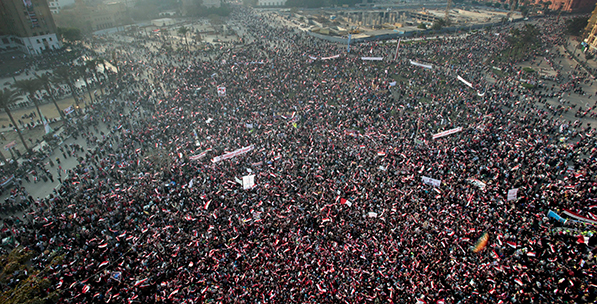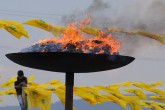The recent decision by an Egyptian court to sentence 529 pro-Morsi demonstrators to death in two short court sessions, once again demonstrated the seriousness of the level of repression and persecution in Egypt after the military coup that took place last year. The decision of the court was the largest capital punishment case on record in Egypt and signaled the possibility of more such mass verdicts in the coming days for the political prisoners rounded up since last summer. In this sense, the regime in Egypt, after showing an enormous level of brutality in the main squares of major cities reminiscent of Tiananmen Square in 1989, started demonstrating the same level of unlawfulness in the court rooms, which, if not stopped, could pave the way for scenes reminiscent of the guillotine terror of the revolutionary tribunals. In fact, a new mass trial launched last Tuesday, bringing to court 682 members of the Muslim Brotherhood including its Supreme Guide Mohamed Badie, is a sign of this looming threat.
After the revolution that toppled Hosni Mubarak during the Arab Spring, Egypt today is passing through one of the most difficult eras in its history. Since the military coup overthrew President Mohamed Morsi, the junta is consolidating its rule through antidemocratic laws and regulations and pursuing mass campaigns that polarize society, potentially leading to its disintegration. The anti-protest law and the detention of journalists are only the most visible parts of the repression of the military regime.
Although some consider the arbitrariness of the recent court decision as shocking, it was a great mistake from the beginning to expect justice and freedom from a military regime. Many around the world, in particular those who experienced military juntas in their countries, watched in awe and shock when some segments of the Egyptian people came together in Cairo and organized rallies to overthrow the democratically elected government with assistance from the military. It was paradoxical in a sense that this crowd accused Morsi of being authoritarian and asked the institution that helped Mubarak rule the country with an iron fist for decades to bring democracy. In fact, while they were blaming the Morsi government for hijacking the revolution, they killed the revolution themselves by bringing the military junta into power.
Former regime elements in Egypt took advantage of the situation and brought the military to power once again in an exemplar case of a reverse wave of democratization. During this period, the most prominent names of Egyptian intellectual life came out supporting the regime of Field Marshal Abdel Fattah al-Sisi and declared anti-Sisi forces “terrorists who received support from external forces.” Sisi supporters also say the “terrorists” want to destroy the stability of the regime and country. Among those are Alaa al-Aswany, the author of “The Yacoubian Building,” who became one of the most vocal voices during this period. According to al-Aswany, what the military was doing in the middle of Cairo during the summer was actually fighting against terrorist forces. While glorifying the military and Sisi, al-Aswany sent messages to the people in its network in the West and asked them to support what he called the next phase of the revolution.
Yes, it was a phase of the revolution. However, it was a counter-revolution and became a bloody one after the military started shooting the pro-Morsi demonstrators in the streets. Al-Aswany and his friends supporting the military junta were intentionally or unintentionally promoters of this antidemocratic and authoritarian process. An author who was once well-known for ending most of his articles with the phrase, “Democracy is the solution,” expects the military to be the solution to Egypt’s problems. Now with the beginning of mass trials and death penalty decisions of the courts, everybody is wondering what will be the position of these intellectuals and community leaders.
[Daily Sabah, 26 March 2014]



